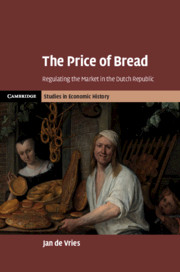Book contents
- The Price of Bread
- Cambridge Studies in Economic History
- The Price of Bread
- Copyright page
- Contents
- Figures
- Maps
- Tables
- Preface
- Note on the Online Database
- Maps
- Introduction
- Part I The Regulatory Regime: Protecting the Consumer and Strengthening the State
- 1 Bread Price Regulation in Europe before the 1590s
- 2 Free Trade in Grain?
- 3 The Dutch Broodzetting: The Introduction of a “New System” of Bread Price Regulation
- 4 Administering and Enforcing the New Bread Price Regulations
- 5 The Dutch “Peculiar Institution”
- Part II Industrial Organization: The Producers in a Regulated Industry
- Part III Consumer Welfare and Consumer Choice
- Part IV Perspective and Demise
- Conclusion
- Book part
- Bibliography
- Index
5 - The Dutch “Peculiar Institution”
from Part I - The Regulatory Regime: Protecting the Consumer and Strengthening the State
Published online by Cambridge University Press: 15 April 2019
- The Price of Bread
- Cambridge Studies in Economic History
- The Price of Bread
- Copyright page
- Contents
- Figures
- Maps
- Tables
- Preface
- Note on the Online Database
- Maps
- Introduction
- Part I The Regulatory Regime: Protecting the Consumer and Strengthening the State
- 1 Bread Price Regulation in Europe before the 1590s
- 2 Free Trade in Grain?
- 3 The Dutch Broodzetting: The Introduction of a “New System” of Bread Price Regulation
- 4 Administering and Enforcing the New Bread Price Regulations
- 5 The Dutch “Peculiar Institution”
- Part II Industrial Organization: The Producers in a Regulated Industry
- Part III Consumer Welfare and Consumer Choice
- Part IV Perspective and Demise
- Conclusion
- Book part
- Bibliography
- Index
Summary
- Type
- Chapter
- Information
- The Price of BreadRegulating the Market in the Dutch Republic, pp. 115 - 144Publisher: Cambridge University PressPrint publication year: 2019

